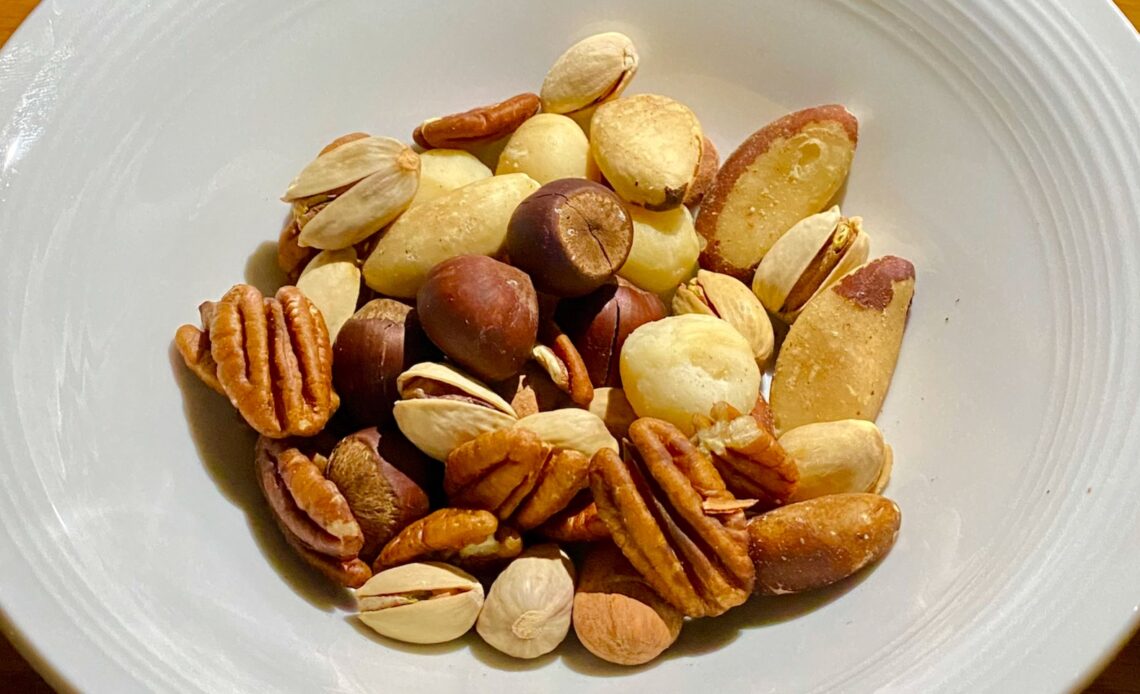
All of my good friends know that the one snack they can always find in my pantry is nuts; All kinds of nuts. They are my absolute favorite snack because they are salty, crunchy, and make a great portable snack I can always stick in my briefcase or backpack.
But that is not the only reason. There’s a compelling argument for choosing nuts! Why? Nuts are among the most nutrient-dense foods. Packed with vitamins, minerals, healthy fats, and phytochemicals with anti-inflammatory activity, they blow chips out of the water as a healthy snack to munch and they taste great too.
Among the many health benefits of snacking on nuts are studies showing that these crunchy orbs may lower the risk of cardiovascular disease and won’t cause a spike in blood sugar like other crunchy but highly processed snacks. For example, eating a handful of nuts daily is linked with a lower risk of cardiovascular disease in studies. You have a variety to choose from too.
Let’s look at seven of the healthiest nuts and why you they belong in your Greek Keto diet.
1. Walnuts
I got hooked on Walnuts when we were living in Greece back in 1979. I was at my Uncle Kostas and Aunt Smaroula’s house when I realized they had a huge walnut tree growing in their yard. I had never seen a walnut grow and didn’t realize the outer part was green and that you only at what was inside the shell, which looked quite different when picked directly from the tree. As I embraced the Keto diet, I realized how important walnuts are to be included in my routine.
You see, walnuts are rich in short-chain omega-3s, including one called alpha-linolenic acid (ALA). Bacteria in your gut convert some of the ALA you take into long-chain omega-3s similar to those in fish oil. Although it’s not clear that short-chain omega-3s have the same health benefits as long-chain omega-3s, they have similar health benefits. However, people differ in their ability to convert short-chain omega-3s to long-chain ones.
Walnuts are also rich in antioxidants that also have anti-inflammatory activity, making walnuts a heart and blood-vessel-friendly snack that beats a package of chips hands down. Are walnuts healthy for your gut too? A study found that adults who ate walnuts for six weeks experienced an increase in gut bacteria that support heart health, along with a drop in cholesterol and blood pressure.
Recently I have been experimenting by using ground walnuts (walnut flour) to make cookies and cakes. In fact, the Spice Cookies, the Walnut Cake (Karidopita), and Greek Kourabiedes recipes I have in the recipes section are based on ground walnuts.
2. Almonds
Growing up in Greece, we had our own almond tree in our backyard, so I was very familiar with how they grew. In fact, we couldn’t wait for the small green almond to appear and we would just eat them right off the tree. They call them “tsagala.” I was later surprised when I visited a Lebanese restaurant while I was living in Kuwait, and they served these little green raw nuts as a free appetizer. They took me back to my childhood on Lesvos Island. So why do you need to eat almonds?
One of the biggest benefits of almonds is their vitamin E content. In fact, almonds top the list of vitamin E-rich nuts. That’s important since vitamin E is an antioxidant vitamin that is important for heart health. Plus, almonds are rich in magnesium and potassium, both of which support heart and blood vessel health. In addition, almonds contain an array of phenols with antioxidant activity and phytosterols that help lower LDL cholesterol. If you’re concerned about heart health, skip the processed crunchies and snack on almonds. Enjoy almonds with their skin intact rather than blanched. Blanched almonds without their skin have fewer health benefits.
My Greek New Year’s Cake (Vasilopita) is completely based on ground almonds. Also on keto, you will discover that almond flour is the main ingredient in many cakes, cookie, and dough recipes. It is not absorbent like coconut flour but certainly helps make many different keto-friendly desserts.
3. Pecans
Since I also grew up in Florida, we would drive often to Atlanta and along the 8-hour route, we would see pecan stands along the way as they abundantly grew in southern Georgia. The taste of this nut is supreme as it is almost like a sweet nut. I do miss eating Southern Pecan Pie. But this nut also has some important nutritional value to our Greek Keto lifestyle. Why? Because pecans are another source of heart-healthy compounds.
Pecans contain a variety of anti-inflammatory compounds, including carotenoids and phenols. In fact, a study ranked them tops in terms of antioxidant activity. Another study, a randomized controlled clinical trial found that replacing 15% of calories with pecans was linked with positive health benefits, including improvements in insulin sensitivity and reduced markers for cardiovascular disease. Plus, pecans are a good source of fiber for heart health.
You can mix ground pecans, with melted butter and a little coconut flour to make a great pie crust.
4. Hazelnuts
From Syria to Turkey, to Lebanon, and to Greece, this nut is found not only in sweet dishes but in savory dishes as well. Another name for the hazelnut is filbert; so you may have heard of it as the filbert nut. And for you Nutella lovers, you may be surprised that this Italian spread is made from hazelnuts. Growing up in Greece, we had Merenda, which is the Greek version of Nutella. One of my favorite snacks my grandmother would fix for me was a piece of Greek bread with a thick layer of Merenda…simple the best. In the US, however, you don’t hear as much about hazelnuts as you do other tree nuts, but they’re a healthy snack.
Plus, they have the distinction of being the nut highest in proanthocyanidins, compounds that give them powerful antioxidant and anti-inflammatory activity. Plus, almonds are rich in the antioxidant vitamin E and contain the B-vitamin folate, another vitamin linked with heart health.
5. Pistachios
On my way to school on Lesvos Island, I would go by this house, The Tsakirakis House, which had this enormous Pistachio tree growing, and many school children would often pick some of these green nuts and eat them raw, similar to the raw almond. For Keto, this has the most carbs so I eat them sparingly, but I still do eat them and especially use them for garnish in many recipes.
Pistachios are a good source of minerals such as potassium, calcium, and magnesium, as well as vitamin E. All of these vitamins and minerals are important for heart and blood vessel health. But pistachios also contain carotenoids, anthocyanins, and proanthocyanidins with anti-inflammatory activity. Studies show that snacking on pistachios may, lower blood pressure, lower LDL cholesterol, and even improve insulin sensitivity.
So, how about a handful of pistachios instead of another less healthy snack? If you buy them in the shell, you’ll have to expend more energy to deshell them. Despite their relatively high-calorie content, studies show that people who snack on nuts tend to be leaner. One reason is the high fiber content reduces the absorption of some of the fat in nuts. Does anyone remember the red-colored pistachios? I can’t imagine (and don’t want to know) just how they would dye these nuts red!
6. Macadamia Nuts
All it took was one trip to Hawaii to realize just what I was missing. At first, I would eat them sparingly. It wasn’t until I started visiting Rwanda on a regular basis that I realized that many African countries also produced the Macadamia nut. So it wasn’t until my trip to Rwanda that I started incorporating this lovely nut into my routine.
The Macadamia nuts have a rich, buttery flavor and health benefits too. One of the lowest carbohydrate nuts, munching on macadamia nuts won’t cause blood sugar spikes. Being a rich source of antioxidants and heart-healthy monounsaturated fats, they’re a snack that has beneficial effects on LDL cholesterol and inflammation. Their high fiber content is beneficial for the gut microbiome too, as bacteria convert this fiber to short-chain fatty acids that help keep the lining of your colon healthy by reducing inflammation.
I recently started seeing Macadamia nut flour, so I’m hoping to start experimenting with this new nut flour to see what creation I can make.
7. Peanuts
Nothing like a Southern Georgia peanut. On many road trips in Florida and Southern Georgia, my dad would stop at road stands selling boiled peanuts and that would be our snack for the road; and they were delicious. Another southern thing we did was to buy a bottle of cold Coca-Cola and drop dry roasted peanuts into the Coke. You wouldn’t appreciate this unless you’re from the south, but it is very delicious.
Peanuts aren’t a true tree nut but a legume, and therefore, have a higher carb for our Keto lifestyles. However, snacking on peanuts is linked with the same heart health benefits as other tree nuts. Plus, peanuts contain more protein than tree nuts and are rich in vitamins and minerals, including B-vitamins, iron, phosphorus, and an antioxidant called resveratrol. Some studies show that resveratrol may have anti-aging benefits, especially for brain health.
I was surprised to find out that in Rwanda, ground peanuts were used to make stews and they were delicious. On my regular trips to Rwanda, I made sure I came back to my home in Jeddah with plenty of Rwandan coffee, Macadamia nuts, Tea, and Peanut powder to add to my stews and deserts.
The Bottom Line
Choose your favorite nuts and enjoy the many benefits this heart-healthy snack offers. Eating a handful a day in place of a less healthy snack could pay off with better health, less inflammation, and a lower risk of cardiovascular disease. Just make sure you count it into your macros! Enjoy!
Because this blog post contains many health claims, here is a list of references used for this article:
- McKay DL, Eliasziw M, Chen CYO, Blumberg JB. A pecan-rich diet improves cardiometabolic risk factors in overweight and obese adults: a randomized controlled trial. Nutrients. 2018;10(3).
- Aune D, Keum N, Giovannucci E, et al. Nut consumption and risk of cardiovascular disease, total cancer, all-cause, and cause-specific mortality: a systematic review and dose-response meta-analysis of prospective studies. BMC Med. 2016;14(1):207.
- Xiong Q, Zhang Q, Zhang D, Shi Y, Jiang C, Shi X. Preliminary separation and purification of resveratrol from extract of peanut (Arachis hypogaea) sprouts by macroporous adsorption resins. Food Chem. 2014 Feb 15;145:1-7. DOI: 10.1016/j.foodchem.2013.07.140. Epub 2013 Aug 9. PMID: 24128441.
- “Peanuts A source of medically important resveratrol.” /nopr.niscair.res.in/bitstream/123456789/12269/1/NPR%202(4)%20182-189.pdf.
- “Macadamia Nuts: Health Benefits, Nutrients per Serving ….” webmd.com/diet/health-benefits-macadamia-nuts.
- Chen CY, Blumberg JB. Phytochemical composition of nuts. Asia Pac J Clin Nutr. 2008;17 Suppl 1:329-32. PMID: 18296370.
- Hiraoka-Yamamoto J, Ikeda K, Negishi H, Mori M, Hirose A, Sawada S, Onobayashi Y, Kitamori K, Kitano S, Tashiro M, Miki T, Yamori Y. Serum lipid effects of a monounsaturated (palmitoleic) fatty acid-rich diet based on macadamia nuts in healthy, young Japanese women. Clin Exp Pharmacol Physiol. 2004 Dec;31 Suppl 2:S37-8. DOI: 10.1111/j.1440-1681.2004.04121.x. PMID: 15649284.


